I’m thrilled to welcome Theresa Weir to Wonkomance this morning. For those of you who don’t know her, she writes wonky romance as Theresa Weir and suspense as Anne Frasier (the official bio at the end of this post will fill in the yummy details, including the fact that she has authored twenty-one novels and taken home a bookshelf full of honors). I’ve been gobbling up Weir’s romances as fast as she can reissue them digitally, but it wasn’t until I read her recent, much-lauded memoir, The Orchard, that I decided that Theresa Weir is, at least in my book, the unofficial queen of wonk and the mother of modern wonkomance.
Please join the conversation by commenting below, and enter to win a hardcover copy of The Orchard. Also, make sure you pick up a Kindle copy of Amazon Lily at Amazon.com today. In honor of her appearance here, Weir has made it free for the day!
Let’s talk about Amazon Lily, your first romance novel, for a moment. It’s the story of “Illinois farm-bred social worker Corey McKinney,” who travels to the San Reys reserve in the Amazon jungle of Brazil on a church mission and meets “magnetic, gravel-voiced bush pilot Asher Adams, whose crudeness has the fascination of Humphrey Bogart’s in The African Queen.” (We highly recommend checking out the Amazon.com descriptions of Weir’s books, which she wrote herself for the reissue. They’re hilarious and truer than true.) You pretty much just sat down and wrote Amazon Lily, more or less on a whim, and you’ve said you wrote it in an authorial void, with no sense of whether it was a saleable romance novel. Why do you think it became what you’ve called a “cult classic?”
I can only guess. Maybe the male POV. And a hero who was… well, pretty sexy and more than a bit weird. This was during a time when male leads weren’t supposed to have a lot of personality. I got some angry letters from outraged agents who read the manuscript. DO NOT DO THIS!! THIS IS NOT A ROMANCE! THIS MAN IS NOT A HERO! HE’S REVOLTING! The funny thing is that I patterned him a bit after my husband. Heh.
Given that male POV was so rare at the time, what made you decide to use it in that book?
The reason I read romance was because of the hero. I really didn’t care about the heroine (which is probably one of my failings as a romance writer). As a reader, I craved a hero with more personality, someone who was more visible. Someone who said things a guy would say, even if those things were abrasive. A hero I would fall for. I think I started writing romance in order to create the heroes I wasn’t finding in the books I read.
How was Amazon Lily received?
Amazon Lily bombed big time. A lot of people don’t realize that, because it’s kind of well known. It had a print run of 7,000. This was during a time when print runs of 200,000 to 300,000 were common, so the failure was preordained. It had no publishing-house backing. Zero. It wasn’t even reviewed in RT. Somehow a few readers found the book (in the men’s adventure section of bookstores!) and loved it. Booksellers too. And romance writers. So the book became kind of famous even though sales were beyond dismal. I remember going to bookstores, thinking I would spot a copy. Never saw it, and quit looking after a couple of months. It was a dark and depressing time for me, and kind of set the tone for my whole romance career. A writer friend used to say you don’t want to be the first wagon through or the last. I was often one of the first wagons, and a lot of this business is about timing.
You’ve won several of the big awards in the Land of Romance, including a RITA for Cool Shade and a RT Reviewer’s Choice Award for Long Night Moon. Do you think you won them because of or in spite of the wonkiness of your novels?
I’m guessing because of the wonkiness. The thing that many people don’t know is that I was a failure as a romance writer. My books sold so poorly that publishers wouldn’t touch me. When Cool Shade was up for the RITA, I’d been dumped by Harper Collins and I was unemployed and broke, doing all of my grocery shopping at the Dollar Store. This has all the makings of a country song, but I was recently widowed with two children, and writing was my only means of support. I didn’t go to the national RWA conference in Chicago because I couldn’t afford it. At the last minute I asked a good friend, Anne McAllister (wonderful romance writer), to pick up my award if I won. “Haha. Not gonna happen in a million years,” I told her. “Don’t worry about it.”
That year the award ceremony could be viewed live over the Internet. I had dial-up, and I watched. Or tried to watch. The screen loaded one quarter of a crawling inch at a time. And suddenly there was Anne standing at the podium! Loading from her feet up. My daughter was watching the computer screen with me, and our mouths were hanging open. Are those Anne’s shoes? Anne’s legs? Anne’s torso? Anne’s face?! Oh my freakin’ Lord! I just won a RITA. I started crying. And my daughter and I were screaming and jumping up and down in my bedroom. It still seems unreal all these years later.
Did winning awards make it any easier or harder to do the every day task of writing?
It certainly helped sell my next book, which was Hush (Anne Frasier). Before that, I could not get anybody to read the book. I think I tried for almost a year. So winning a RITA for romantic suspense opened doors that had been closed.
Who are your favorite offbeat/thinky/champion-of-the-wounded romance writers?
Back in the day, I really loved Loveswept authors and loved what was going on at Bantam’s Loveswept. Editor Carolyn Nichols founded the line, and those books were a breath of fresh air. (I never wrote for Loveswept, but I wrote for Bantam.) I really think Loveswept changed the landscape of romance. They removed the boundaries. They encouraged writers to color outside the lines. The books were fresh and fun and fast and daring. In fact, if any editor could be considered a champion of wonk, it would be Carolyn Nichols. Loveswept invited authors to push the boundaries. To completely ignore the boundaries.
I read somewhere you write in a church. That’s pretty wonktastical. How’d you come to work there? Does the location have any resonance for you?
I’ve always loved nontraditional spaces, so the church immediately appealed to me. And I have to say that there’s something about writing in such an open room. I think I suffer from claustrophobia, and the space just opens up my head. It’s the best writing space ever.
Where does wonkiness come from? Is it something one either has or doesn’t have? Can it be cultivated? Have you ever deliberately cultivated it?
I’ve never cultivated it. That would be like cultivating a curse. :-) I’ve fought it because I always felt it kept me from being a success. And yet, I couldn’t stop it. I wasn’t interested in the story unless the characters were wonky. I think wonkiness might come from a dark sense of humor? And also a nonconformist personality.
Have agents or editors ever tried to convince you to write books that are less wonky?
Almost everyone I’ve ever worked with. And I’ve honestly tried to shut it off. I wrote a few books that weren’t so wonky, and my heart wasn’t in it. I’m pretty sure I was dumped again and again because of wonkomance, because I wrote these WTF books. I was told that the houses just didn’t know what to do with me. Didn’t know how to market me. Didn’t know how to package the books. I was often told that I couldn’t have TWO CHARACTERS WHO WERE MESSED UP. That was a pretty firm rule, so I did try to write some books with just one messed-up lead. But I can’t entirely blame my lack of romance success on the wonky nature of my characters. My writing had a tone/voice that might be called casual smartass (maybe this ties into being wonky). I remember editing my material, trying to tone down the smartass, but I could never get rid of it all. I say things like, “Let’s blow this joint.” That’s how I talk, and that’s how I often wrote. So I had to pretend that I knew how a mature female would speak and think. Ha.
I want to add that it’s not just romances that suffer from lack of wonk love. Here’s what I was told after turning in Play Dead (an Anne Frasier thriller): “The hero doesn’t have a single redeeming quality. Because of that, I won’t be backing this book within the house.”
I was given the chance to rewrite his character. I almost always go along with editorial requests regardless of how I feel about them. It’s my job. It’s what I’m paid to do. This was a rare exception for me, and I declined the chance to rewrite the character of David Gould, and I chose to go with no backing. Any writer will know this is a career-killing move, but this was a character I felt strongly about. Sometimes we have to stand up for our characters. And I never rewrote the character of Asher Adams (Amazon Lily) even though many people told me I would have to because he wasn’t a romance hero. But there are just some characters you can’t water down. It wouldn’t be right. You create this character with a bright and shining light, and then you are asked to dim it. No.
What advice do you have for writers who are trying to balance their own stories/voices with what “the market demands?”
I suspect one thing that could make a difference is finding an editor who gets you. Back when I was writing romance, I would have said be prepared for heartbreak, but I have to hope editors and readers are more open today. Over and over I hear readers bemoan the fact that I left romance. I never left romance. Romance left me. I couldn’t sell another romance anywhere. I have a stack of proposals that were turned down by every romance publisher out there. Nobody in New York wanted a Weir romance.
You’ve started re-releasing your romances digitally. What kind of response have you gotten from readers, and how are they selling?
I’ve been surprised by the positive response because I personally feel the books are dated, some more than others. And I don’t mean dated as in a lack of cell phones and an excess of body hair :). Heroines today are stronger and more self-assured, and heroes aren’t as obnoxious. It’s that simple. My reissued Frasier suspenses sell better than my Weir titles, but I’ve been very happy with the romance sales.
Did you know when you were writing The Orchard that you were writing a love story?
No, had no idea I was writing a romance. Absolutely none. Once the first draft was finished, I saw that it was a twisted romance, which is what I began calling it. “I’m writing a twisted romance! And it’s nonfiction! And it’s about me!” Realizing that it was a romance made it easier to edit and weed out the scenes that didn’t fit. Writing nonfiction is the opposite of writing fiction, because with nonfiction you start with all of this information and you cut away the stuff that doesn’t fit the theme and tone and mood. With fiction, you build from a speck of an idea. And it wasn’t until you started your website that I realized that The Orchard is also a wonkomance. Suddenly my whole freakin’ writing career made sense. I even borrowed from the Wonkomance manifesto in my description of The Orchard. “Messed-up girl meets messed-up boy.” I hope you don’t mind, and I have to thank everybody at Wonkomance for opening my eyes! It’s been like a free trip to a shrink.
On the contrary! We’re flattered by the imitation. And so pleased to be your free psychiatric care. Any time.
Thanks so much, Theresa, for your time and the funny, thoughtful answers. Oh, yeah, and for all that really great wonk. That woulda been us in the men’s adventure section of the bookstore.
We welcome comments and conversation. If you comment and leave us a way to contact you, you’ll be entered in a drawing to win a hardcover copy of The Orchard.
Theresa Weir (www.theresaweir.com) is an award-winning, USA Today bestselling author of twenty-one books and numerous short stories that have spanned the genres of suspense, mystery, thriller, romantic suspense, paranormal, and memoir. Her memoir, The Orchard, was a 2011 Oprah Magazine Fall Pick, Number Two on the Indie Next list, a featured B+ review in Entertainment Weekly, and a Librarians’ Best Books of 2011. Going back to 1988, Weir’s debut title was the cult phenomenon Amazon Lily, published by Pocket Books. She wrote thirteen romances before moving into suspense. In her more recent Anne Frasier career, her thriller and suspense titles hit the USA Today list (Hush, Sleep Tight, Play Dead) and were featured in Mystery Guild, Literary Guild, and Book of the Month Club. Hush was both a RITA and Daphne du Maurier finalist, and Pale Immortal was a RITA finalist.


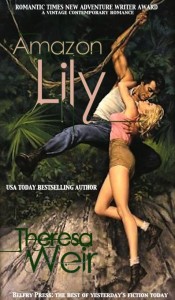
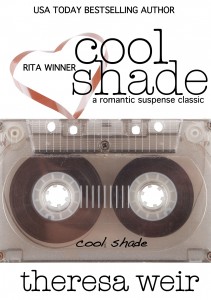
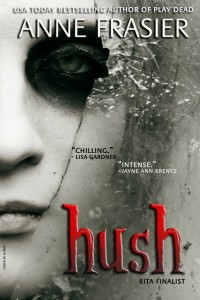
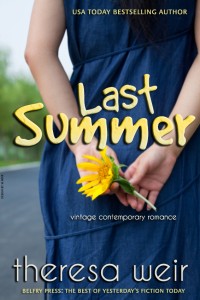
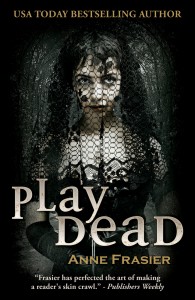
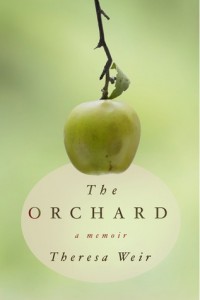





















This was a really interesting look at your career. Amazon Lily sounds like a great book. I’m glad to hear that your romances are finding new life in the digital world.
I feel the same way about heroines in romance books. I read romance for the guys. If I could only choose 1 POV to be in, I’d rather it be the man’s than the the girl’s. I love seeing how they think and react to the heroine.
Thanks for sharing! Great interview, Serena. :)
Thanks, Gina! I’m the same way about POV, too, btw. I prefer writing the hero’s. I’m grateful to be writing in an age when hero POV is nearly a necessity, rather than something weird and wonky. But it does go to illustrate, I think, that today’s wonk–pushing the edges of what’s acceptable in the genre–is tomorrow’s mainstream. So wonkiness serves an important purpose–keeps the genre evolving.
I love this interview. Thanks for talking to us about your career, Theresa! I’m so fascinated by this whole thing — how and why we write what we do, how we shoehorn ourselves (or don’t) into the market, which books resonate with readers despite or because of the wonk. I got so inspired by what you said about Carolyn Nichols and Loveswept, I’m going to do a post on it next month. Viva la wonk!
Thanks, Ruthie! And thanks for contributing to the interview questions.
Loveloveloved this interview. It really delved into the heart of everything. I so appreciate all the work that went into putting this together. Thanks so much!!! Carolyn Nichols was a groundbreaker. Can’t wait to see the post.
Thanks, Theresa–I’m so glad you enjoyed the interview! It was completely and totally my pleasure to put it together and learn more about what makes you tick–definitely a labor of love. And thanks so much, too, for making AMAZON LILY free for us, and for THE ORCHARD giveaway.
Great to see non-traditional, wonky romances doing well! Congratulations on your success. These books sound great.
Total tangent…I love your hair, Theresa. Hahaha!
Thanks for visiting, Kendall, and for commenting! I hope you get a chance to dig in to some Weir/Frasier books–I know you’ll love them. (And yeah, that is the best publicity photo–equal parts fabulous and terrifying.)
Kendall, thanks about the hair! ha! I’m going through withdrawal because there is no Manic Panic Bad Boy Blue to be found anywhere on the planet. Damn Katy Perry.
Loved the interview. I cherish my old copies of Theresa’s books, all of them. I go back and re-read them every few years. I guess her characters speak to me. They’re a little off the beaten path, so to speak. Love that the books are being re-released onto digital form; now I don’t have to go dig through boxes!
Thanks, Sherry! Her characters speak to me, too. I feel lucky to have discovered her in the age of digital re-releases so I can glom them in rapid succession and re-read at will. :-)
I love your point about not cultivating wonk, and I think it’s true for most of us. Yesterday on Twitter (I start so many sentences that way these days…) we were talking about who did/didn’t read or write wonk…seemed like only Charlotte Stein is in complete acceptance and awareness of her deep wonkitude. The rest of us either don’t realize we read it, or don’t set out to write it. The wonk happens despite our best efforts – which is so often true of the characters.
Speaking of characters: a hero with no redeeming qualities whatsoever? Sign. Me. Up.
And, on a slightly tangential note: do you ever wonder if doing interviews and such actually translates into sales? You just sold two books to me, O Queen of Wonk (would’ve been more than two but I’ve long since surpassed my monthly book budget). And by “just” I mean “I paused in the middle of reading the post, and starting buying stuff on my Nook because I couldn’t wait.” Plus everything I could download for free at the Nook or Kindle stores, of course.
I think I’ll start with Amazon Lily. Always was a sucker for Bogart.
A good interview can probably sell a zillion books. But most interviews aren’t that good. This one is great. Hats off to Serena and Theresa!
Aw, Ruthie, thanks. It’s really all Theresa. You could ask her what she had for breakfast and she could make it interesting.
Del — I’m really sorry I wasn’t able to chime in yesterday on Twitter when you guys were talking wonk. I would definitely claim I don’t write wonky, but now I’m curious whether that’s true. I do know I read, and prefer to read, wonk.
I think it’s interesting that despite the denials, many of us are here, celebrating wonkiness. We must know who we are at some level, even if we’re not quite willing to own up. Or maybe it’s that we’re all slightly self-deprecating and we (secretly or not-so-secretly) love wonk so much it’s like anything else in our lives–we prefer to say, “Me? Naw … But do check out so-and-so. She’s a wonktastical genius.” :-)
Two words for you, Serena: Onion. Goggles.
Oh. Yeah.
Delphine, LOL about Sign. Me. Up.
I never expect interviews to sell any books, so nice to hear it had you shopping!
I had the same reaction. “No redeemable qualities? Score! Where’s mah credit card?”